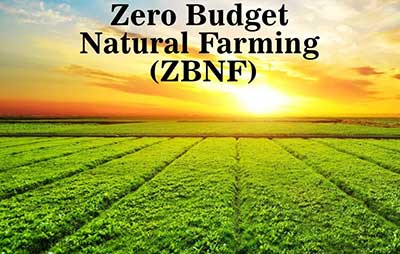GS-3: Major crops-cropping patterns in various parts of the country; Conservation, environmental pollution and degradation
Key Phrases: Krishi Vigyan Kendras, ZBNF, Jeevamrutha,Bijamrita, Acchadana, Whapasa,Waste to wealth, Rishi Farming, Vedic Farming, Cow Farming, Paramparagat Krishi Vikas Yojana (PKVY) , Rashtriya Krishi Vikas Yojana (RKVY).
Why in the News ?
- Prime Minister will address a national summit to popularize zero-budget natural farming (ZBNF) on 16 December in Gujarat’s Anand, as policymakers prepare for a big push for the technique which the scientists say is yet “unproven”.
- The National Summit on Agro and Food Processing, in which the PM is set to make this address, will involve nearly 5,000 farmers who are expected to take part in the summit, apart from 80 federal institutes of the Indian Council of Agricultural Research and Krishi Vigyan Kendras.
What is ZBNF?
- ZBNF, a technique of farming developed by Padma awardee Subhash Palekar of Maharashtra, aims to help farmers bring down input costs by shifting away from agricultural chemicals and relying instead on natural inputs, mainly an admixture of urine and dung of native Indian cows.
- At the heart of ZBNF is the idea that nearly 98% of nutrients needed by crops such as CO2, nitrogen, water and sun are available naturally and free of cost. The remaining nutrients need to be absorbed from the soil. They are converted from non-available to available form through the action of microorganisms and an admixture of cow dung and urine.
Four components of ZBNF:
- Jeevamrutha: It is a mixture of fresh cow dung and aged cow urine (both from India's indigenous cow breed), jaggery, pulse flour, water and soil; to be applied on farmland
- Bijamrita: It is a concoction of neem leaves & pulp, tobacco and green chilies prepared for insect and pest management,that can be used to treat seeds.
- Acchadana (Mulching): It protects topsoil during cultivation and does not destroy it by tilling.
- Whapasa: It is the condition where there are both air molecules and water molecules present in the soil. Thereby helping in reducing irrigation requirement
Benefits of Zero Budget Natural Farming (ZBNF):
- Beneficial for Small farmers: As both a social and environmental programme, it aims to ensure that farming – particularly smallholder farming – is economically viable by enhancing farm biodiversity and ecosystem services.
- Enhance soil fertility: ZBNF reduces farmers’ costs through eliminating external inputs and using in-situ resources to rejuvenate soils, whilst simultaneously increasing incomes, and restoring ecosystem health through diverse, multi-layered cropping systems.
- Waste to wealth: Cow dung from local cows has proven to be a miraculous cure to revive the fertility and nutrient value of soil. One gram of cow dung is believed to have anywhere between 300 to 500 crore beneficial micro-organisms. These micro-organisms decompose the dried biomass on the soil and convert it into ready-to-use nutrients for plants.
- Efficient Energy Consumption: ZBNF requires only 10 per cent water and 10 per cent electricity than what is required under chemical and organic farming.
- Climate Resilient features: ZBNF can improve the potential of crops to adapt to and be produced for rising climatic stressful conditions.
How is ZBNF better than Organic Farming?
- Organic agriculture often involves addition of materials required in bulk and have to be purchased.
- Organic requires large amounts of manure, vermicompost and other materials. Thus, organic turns out to be expensive for most small farm holders.
Issues Related to ZBNF
- The technique has not been scientifically validated and there is no evidence to show if it yields added any value for farmers, as per scientists.
- In 2019, the National Academy of Agricultural Sciences (NAAS) expressed concern over the possible negative impacts of ZBNF on farm incomes and food security.
- Many farmers have reverted to conventional farming after seeing their ZBNF returns drop after a few years.
- While ZBNF has definitely helped preserve soil fertility, its role in boosting productivity and farmers’ income isn’t conclusive yet.
- ZBNF advocates the need of an Indian breed cow, whose numbers are declining at a fast pace. According to the recent Livestock Census, the country’s total population of indigenous and nondescript cattle has dropped by 8.1%.
Government Initiatives
- Indian Government promotes natural farming through schemes of Paramparagat Krishi Vikas Yojana (PKVY) since 2015-16 and also through Rashtriya Krishi Vikas Yojana (RKVY).
- Revised guidelines of the PKVY scheme includes various natural farming models like Organic Farming, Rishi Farming, Vedic Farming, Cow Farming, Homa Farming, Zero Budget Natural Farming (ZBNF) etc.
- In budget 2019-20, the government is ready to take steps to promote Zero Budget Natural Farming (ZBNF) to reduce the cost of production of farmers and thereby double their income.
Way Forward
- Thus, the need is for a comprehensive study both temporally and spatially to assess the performance of ZBNF, before roll out at a wider national scale. The need is to move ahead from food sufficiency to food sustainability, and ZBNF provides us a golden opportunity, not only to fulfill our food security needs but also to make agriculture more climate resilient.
Mains Question:
Q. What do you mean by Zero-Budget Natural Farming (ZBNF) ? Discuss how the ZBNF can be the panacea for addressing the triple whammy of poor crop yield, high inputs cost and rising climate distress associated with the Indian agriculture (15 marks)
Source- The Hindu Newspaper









